As groups of friends and families across Ontario are gathering to study the recent guidance of the Universal House of Justice, they are noting the broadening focus of the Nine Year Plan, encompassing three interconnected areas of endeavour: expansion and consolidation, social action and participating in the discourses of society.
While “the endeavours of the worldwide Bahá’í community can be seen in terms of a number of interacting processes”, one can see in the following stories the way “the influence of the training institute is vital.”[1] A children’s class in Kingston, Ontario had a rising awareness about access to food in their community and took a simple step that uplifted the hearts, junior youth in Mornelle, Toronto, brought their curiosity to the local business owners of their neighbourhood, an expanding nucleus of friends in Muskoka offered practical help to local women’s shelters and lastly, aware of the impact of a fresh war beginning in the Ukraine, a Toronto mother and son were invited to share insights into peace and unity with an entire classroom at their local school. Each of these stories sheds light on the dynamics of social action and contributing to the discourses of society.
“At heart, this is simply a capacity for participating in a conversation about a matter that affects people’s lives and offering a perspective grounded in Bahá’í principles and Bahá’í experience. Viewed in this way, it is a skill which many Bahá’ís have the opportunity to practise almost daily, for instance in their studies or occupations, and which is cultivated through involvement in institute courses; in its more formal expression, it is central to the work of the Bahá’í International Community and national Offices of External Affairs.”[2]
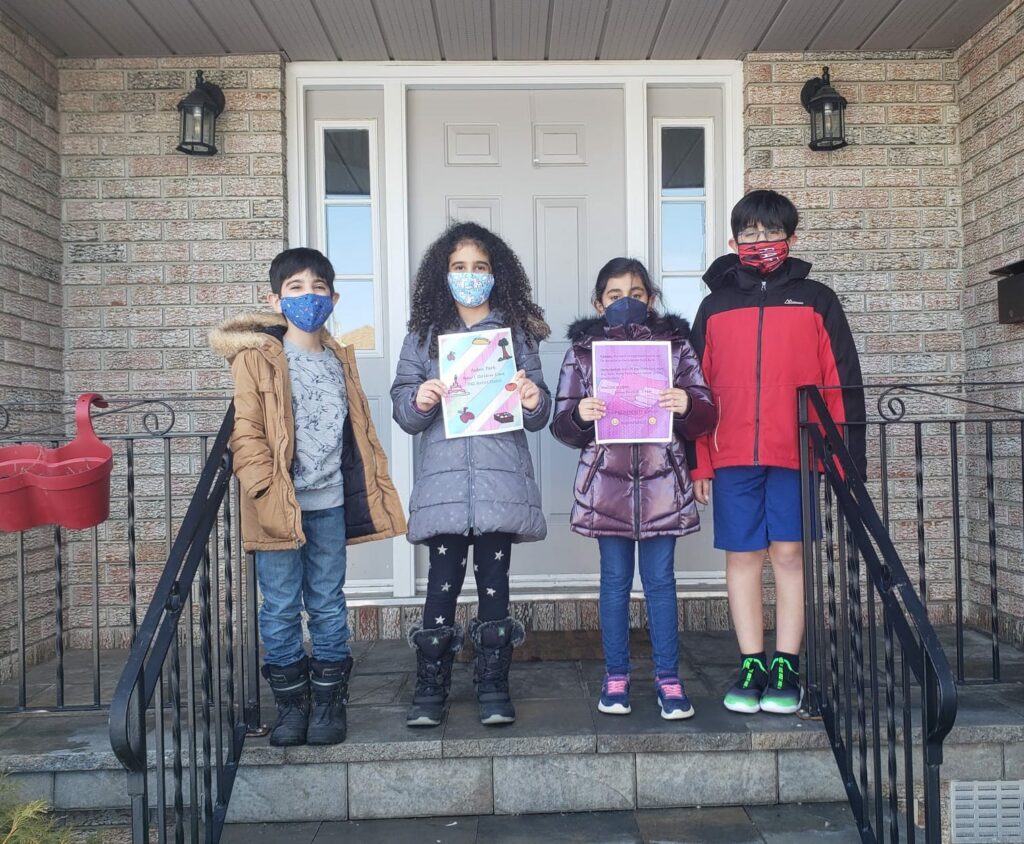
Kingston
The children’s class in Kingston initiated a service project in February. Initially they worked on some ideas and given the spirit of the time of Ayyám-i-Há and the spiritual quality of generosity, they consulted and decided to undertake a Food Bank project. They worked together and hand designed the invitation card which was subsequently digitised and printed to be hand delivered to some of the neighbours here. Bolstered by some good weather, they headed out after some prayers and practised overcoming their shyness and hesitation. Assured of the divine confirmations that will surround their service, the children approached the houses and to their great surprise were warmly welcomed by all those who were home and opened their doors. They were so graciously encouraged by everyone they met and reminded of the importance of their great service to the community. Each person promised to support them in two weeks when they will go back to collect the food donations. The adults and children’s class teachers also felt this was “such a tremendous experience after two years of lockdown, and a great pleasure for me to get to know our neighbours better.”
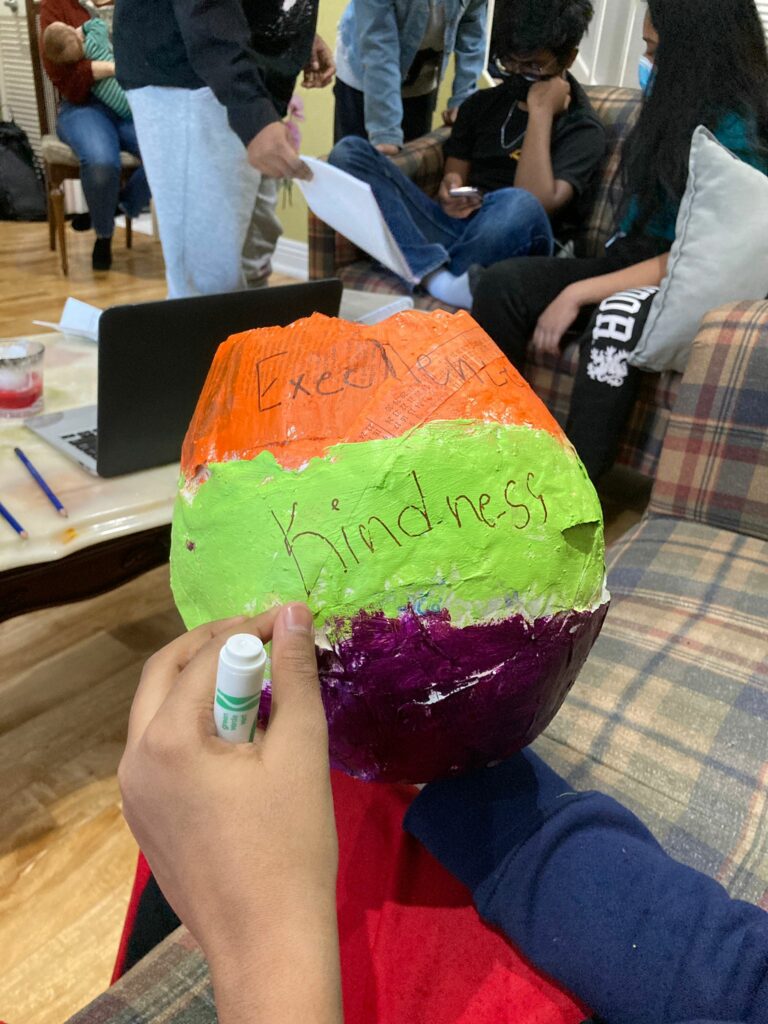
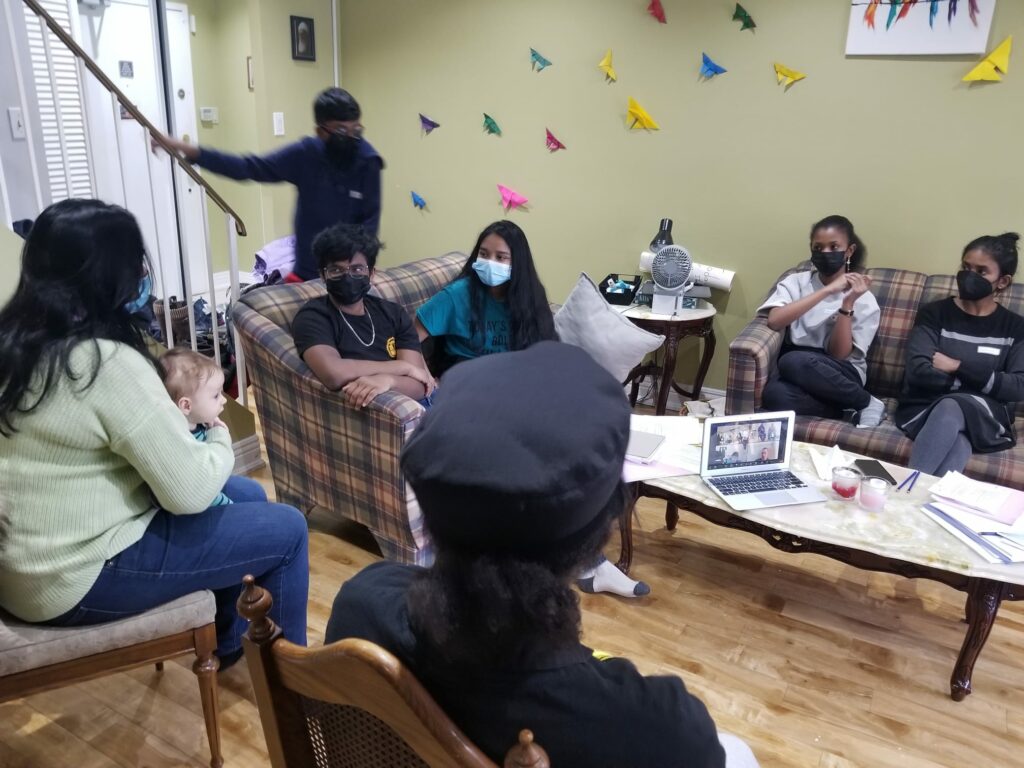
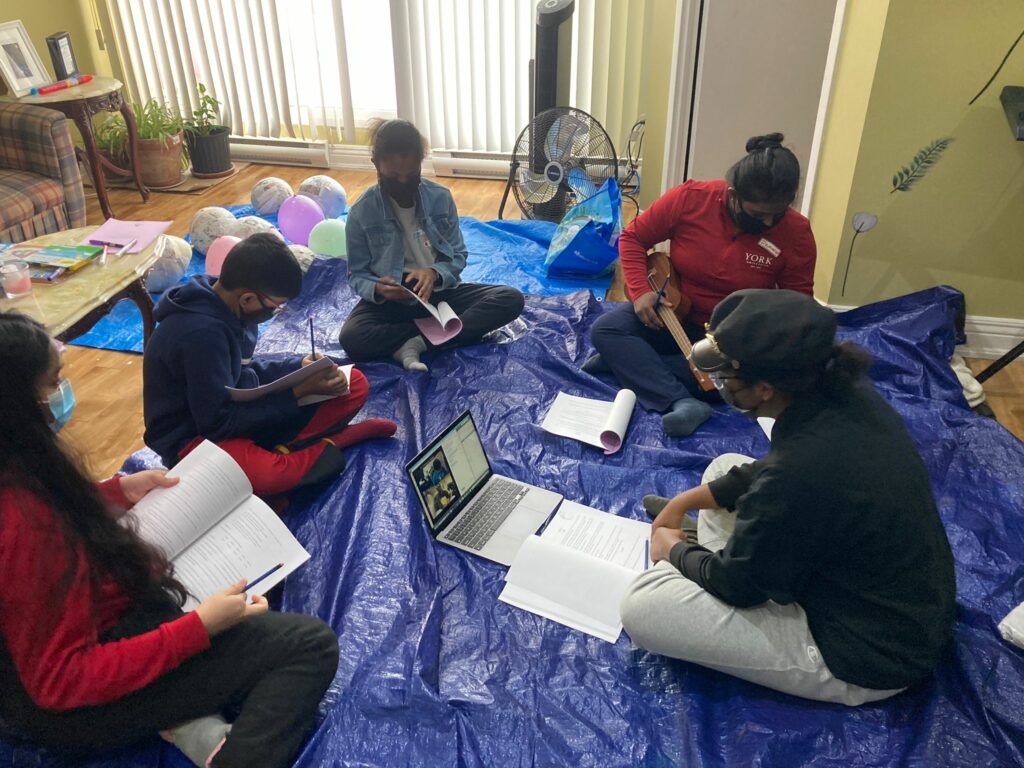
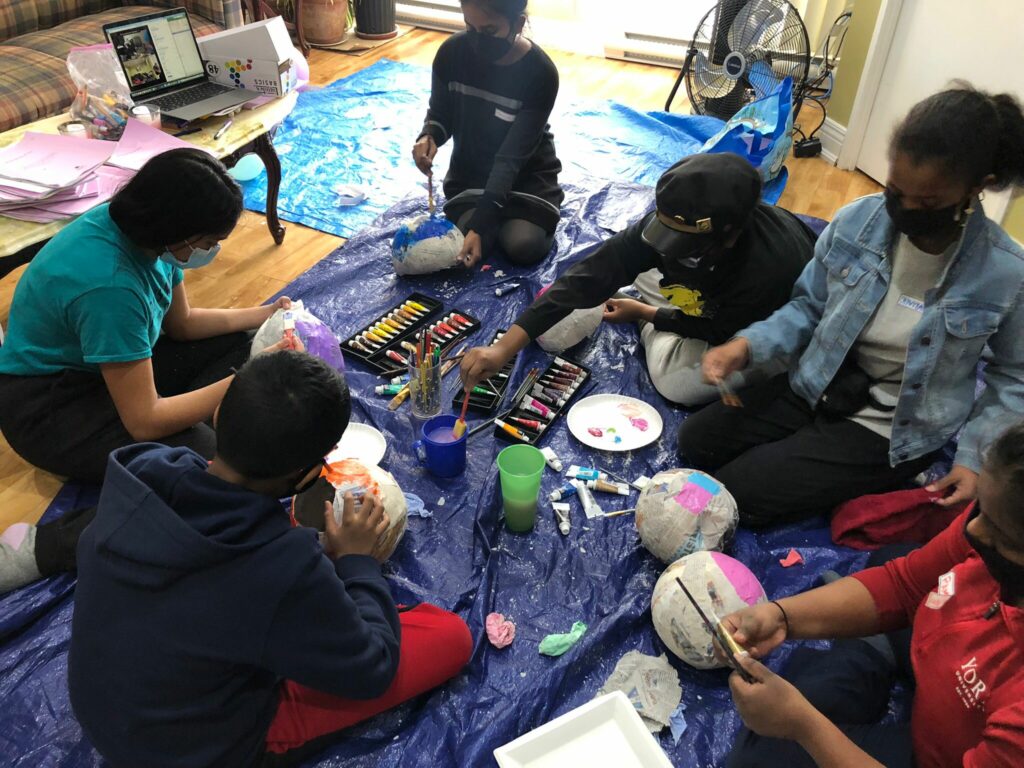
Mornelle, Toronto
For the Family Day long weekend, the team in the Mornelle neighbourhood held a youth and junior youth camp, giving the youth an opportunity to animate. The junior youth are studying the text Wellspring of Joy. Over the two days they did a papier mache art activity inspired by the quotation in lesson 6 “Today is the day for steadfastness and constancy. Blessed are they that stand firm and immovable as the rock”[3] The shape was supposed to be a rock or gem, and some made bowls. After decorating their forms, they wrote the beliefs they would want to keep constant in their lives on their pieces, including academic excellence, good friendships, and kindness.
The junior youth were inspired by their conversations around the text to take action together. They talked about their community and how the businesses and families are being affected by rising rent and how the community gathers to discuss its challenges and tries to help one another. With a desire to better understand how difficulties are addressed in their community, they decided to interview four business owners in the neighbourhood and nearby. The questions they asked included: What motivated you to start your business? What was an important lesson you learned working in your business? How did the pandemic affect your business? What advice would you give us in serving our communities through business or other ways?
One of the business owners, a personal trainer, shared with some of the animators afterwards how impressed they were with the questions and interactions of the junior youth and expressed a desire to help with the activities of the group in the future.
Muskoka
In mid-January, after building an understanding of their emerging nucleus, and keeping up a weekly devotional gathering for some time, the friends in Muskoka held their first Reflection meeting and consulted on plans for the upcoming Ayyám-i-Há celebration. Several great ideas were planned and executed over the 4–5-day period but the project that seemed to have the most enthusiasm and energy was to do a service project involving the two women’s shelters and the men’s shelter within the cluster. One friend suggested they reach out to a friend who is employed at the women’s shelters. That conversation gave the team an idea of how to contribute, which was much appreciated by all concerned.
It was suggested that they could put together a bucket of cleaning supplies for those leaving the shelter, so they could prepare their new accommodation for occupancy. As it turned out, the timing was perfect as there were four women who were scheduled to be moving into their own homes in the next two weeks.
The team prepared five buckets for each of the two women’s shelters. Another friend then delivered the buckets to the Bracebridge and Huntsville locations. There was a lot of joy for everyone involved in the initiative. Monetary donations from Bahá’ís within and without the Muskoka cluster will be donated to the men’s shelter in Huntsville as part of the recognition and celebrations of Naw-Rúz.
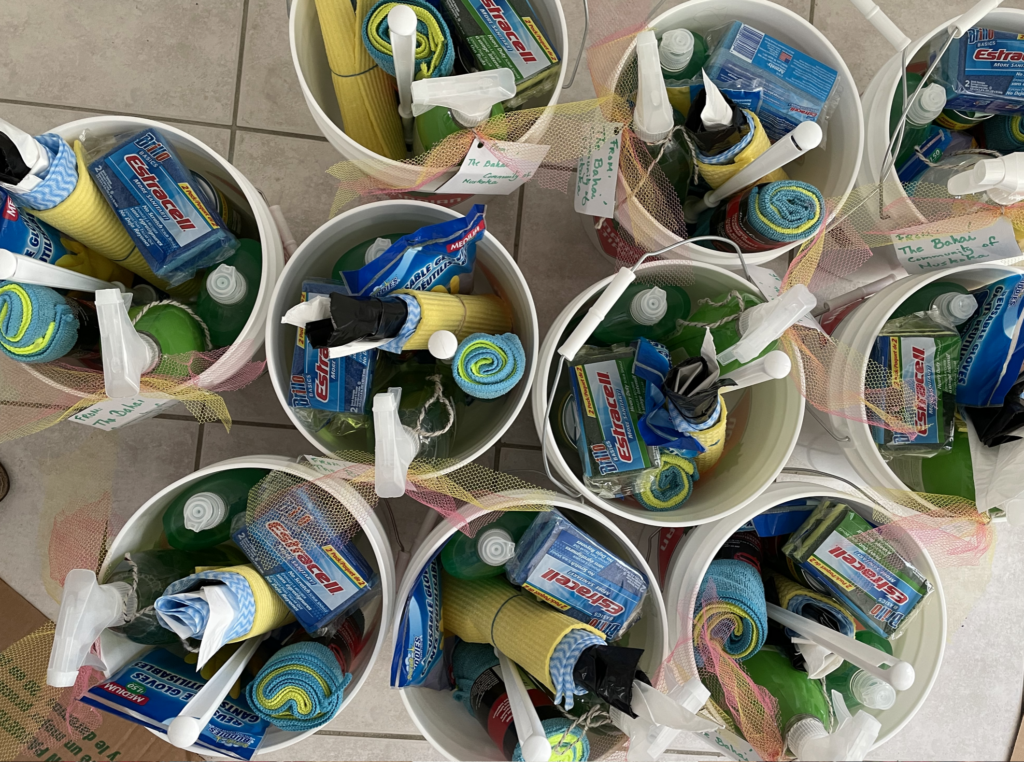
St. James Town, Toronto
At the same time, many parents across Ontario take the opportunity to connect with their children’s school teachers about Bahá’í Holy Days and celebrations. One such mother found that taking this step led to further meaningful conversations:
“Right before Ayyám-i-Há, my son’s teacher sent a message to the parents telling us that many of the children were asking about the war in Ukraine and that they had had a long conversation about it. I reached out to two of my friends that I collaborate with on a children’s class and asked if they had any ideas of Baha’i principles that could be contributed to this conversation. One friend suggested I share the quotation: “When a thought of war comes, oppose it by a stronger thought of peace.”[4]
I thanked the teacher for taking the time to have these conversations with the children and mentioned that we had spoken with our son about the war and we had discussed the above quotation, noting that one way we can contribute to peace is by reflecting on our thoughts. I also wrote to her about the Baha’i Holy Days and asked if we could celebrate the festival of Ayyám-i-Há in the classroom.
After school, I had a conversation with the teacher and she thanked me for sharing the quote and said that she felt that the kids were quite wise and were able to see that the way we treat each other is so important in building peace in the world. She encouraged me and my son to share more about the Baha’i Faith with the children in the class through a video. We shared with her other videos and resources but she seemed to prefer that we tell it in our own words.
I consulted with my son about recording an explanation about the Bahá’í Faith and Ayyám-i-Há. Initially, he was not too enthusiastic, saying that everyone likes Christmas and Halloween, and that no one knows about Ayyám-i-Há. Thankfully, after attending several Ayyám-i-Há celebrations and reading a children’s book about Ayyám-i-Há given to us by a friend as a gift, he was excited to make the video. I asked him how he thought we should explain the Baha’i Faith to his friends. He immediately came up with an idea that I think he must have gotten from attending a children’s program on unity facilitated by some youth in the area, based on the junior youth materials. For our video, I explained that peace and unity are some of the central principles of the Bahá’í Faith and that we thought it would be a good time to discuss them given the events of the world, including the war. My son brought out a bunch of sticks. He tried to break one stick, and it of course broke easily. He then tried to break the whole huge bunch of sticks, but it was impossible. He explained that unity is important because when we are together we are stronger and can do more, just as it is very easy to break one stick, but much harder to break many. He then shared the quotation: “So powerful is the light of unity that it can illuminate the whole earth”[5] in both English and in French, since my son is in French immersion. The full story that his demonstration was based on is attached.
After the students watched the short videos in school and received a simple Ayyám-i-Há gift package that we had prepared, the teacher sent out a message to all the parents sharing the videos explaining Ayyám-i-Há and the Baha’i Faith. She wrote: “Some important themes are unity, generosity and service. We connected this to what is happening in the world right now; especially about being united so that more kindness and love is spread, and so that when we stand up against violence and racism, we have a stronger voice.”
After Ayyám-i-Há one of the parents approached my husband and thanked us for sharing. He mentioned that his son had talked to him about unity and mentioned the stick analogy that my son shared, noting that it was unusual for him to remember something he learned in school so well.
Recently, my son’s teacher asked the children to name famous women, and my son named Tahirih so the teacher asked me to provide information about her so that she could discuss Tahirih today in the classroom. It has been a joy to collaborate with my family, friends and the teacher to learn to contribute Bahá’í principles to some of the interesting and challenging conversations that are happening in the classroom.”
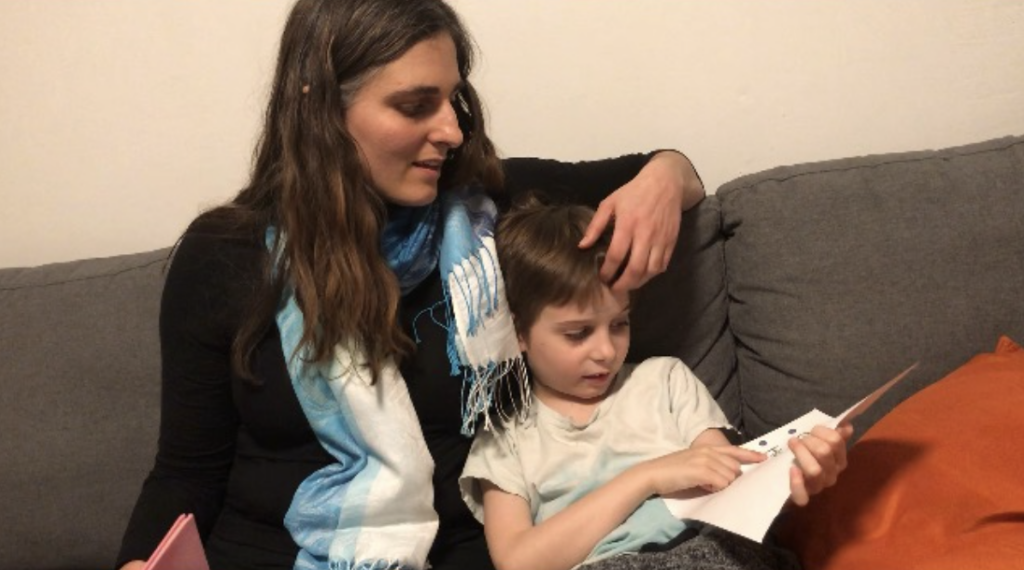
No doubt, in the coming months and years, the friends in Ontario will continue building their capacity to engage in discourse and contribute to the spectrum of social action endeavours, recognizing that, “One righteous act is endowed with a potency that can so elevate the dust as to cause it to pass beyond the heaven of heavens.”[6]
[1] Office of Social and Economic Development, Statement on Social Action, 2012
[2] Universal House of Justice, December 30, 2021
[3] ‘Abdu’l-Bahá, Selections from the Writings of ‘Abdu’l-Bahá
[4] ‘Abdu’l-Bahá, Paris Talks
[5] Bahá’u’lláh, Epistle to the Son of the Wolf
[6] Bahá’u’lláh, Gleanings from the Writings of Bahá’u’lláh


